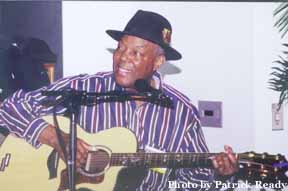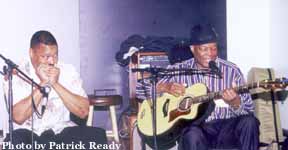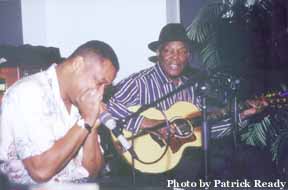Cephas and Wiggins, No Boundaries By Brenda Whitehurst Rollins
Certainly, since each was born in Washington, D.C., and both still live in states bordering the District, the Piedmont style was a strong influence. But the pair claim many influences, past and present, and all of them can be detected in their work. You will see for yourself if you catch one of their concerts or spin an early CD like "Let It Roll," then listen to a recent disk like "Homemade" or the sizzling "Cool Down." In February, the duo presented something old, something new and everything "blue" in concert at Pellissippi State Community College in Knoxville, Tennessee. Between tunes, Cephas offered insights and anecdotes touching on the origins of songs and of the blues itself. One song, "Jesus is Mine," illustrated the crucial religious link to the early blues. It was followed with the romping, stomping vintage song, "Mamie," an example, in Cephas' words, of "gut-bucket blues." Next, to illustrate Blind Lemon Jefferson's Texas Delta influence, the two rollicked through "Hot Dog," following it with the prophetic Jefferson composition "See That My Grave is Kept Clean," a melancholy plea recorded by the storied Lemon shortly before his untimely death. All the while, Wiggins' malleable harp bent notes, caressed them, slapped the dancing rascals on their backsides, and tinted them indigo. "The thing about the blues," Wiggins said, "is that you never feel the same way, and that keeps it interesting. The most exciting thing for me is that you improvise. As a blues musician, you do it different every time."
Their latest CD, "Cool Down," features some memorable compositions also heard at the concert. Perhaps the hottest of those, penned by Phil Wiggins, is the title tune. Wiggins, a concerned father of teens himself, vocalizes the frustrations of inner-city youth in a manner as current as today's news, yet as blue as the Delta's past. In the CD liner notes, Cephas underscores his partner's ability as a writer with the comment that "Phil takes life apart and checks the pieces when he writes a song." How true. Wiggins may be the "quiet type," but when he speaks — especially in a song — it's definitely worth listening to. "No Ice in My Bourbon" also offers insight into Wiggins. When asked about the title, he replied with a sly chuckle, "I don't like anything watered down." The CD "Cool Down" also says much about John Cephas. As does "Homemade." The duo offered the best of both albums in their Pellissippi concert. In Cephas' composition, "Backbiter," chords reminiscent of the Delta's Elmore James may be heard. A change of pace came next with the selection, "Special Rider." In this haunting song, Cephas explores the higher ranges of his honeyed baritone — no doubt to complement the artistry of kora musician Djimo Kouyate, who worked with the two on the popular Echoes of Africa Tour. The kora, an authentic African instrument utilizing a sound box fashioned from a large, halved gourd partly covered in cowhide, is strung with 21 strings, 10 on one of its sides, 11 on the other. The player "has the full diatonic scale," according to Cephas, so no fretting is necessary. Proof that the vertically-held kora is a direct ancestor of the Piedmont sound lies not only in its general shape, Cephas explained as he sketched the instrument on paper the evening before the concert, but also in that it is "plucked with the alternating-thumb-and-finger-picking technique" characteristic of the Piedmont style. Cephas added that the first time he and Kouyate played together, each was amazed at how uncannily similar the instruments were. Those similarities come across dramatically in "Special Rider." Though the kora and guitar are kinfolk, the kora has a ringing overtone not unlike that of wind chimes in a fickle breeze. At first hearing, the instrument seems to work at cross purposes with the more structured rhythm of guitar and harmonica. But in truth, the exotic syncopation adds a new dimension that could be an intriguing addition to future Cephas and Wiggins concerts. The words of Wiggins' upbeat "The Blues Will Do Your Heart Good" offer solace in the blues even when things are at their worst: "It's the way I feel about the music," Wiggins said over dinner the evening before the concert.
John Cephas agreed. "The blues were created in an atmosphere of hard times, and it was about rising above all that." The blues, he added, were "a tonic." And Lord have mercy, they still are. Nuances. Tempo changes. Vocal twists. Exciting stuff that keeps it interesting for the audience too. Add to the mix the easy warmth the two convey in personal appearances, and you have got blues that intoxicate like moonshine whisky. When asked if there were occasions that "magic" occurred between their audience and themselves, both nodded without hesitation. Cephas, the more outgoing of the two, answered with characteristic enthusiasm, "It happens all the time." He gestured with his expressive hands and added, "When the lighting is just right and you can see someone, maybe in the front row, who can give you a smile or pat their feet, then you can feel their emotion" — and the magic is there. The pair have become world travelers over the years, and as an example of "magic," Cephas cited the audience at a recent Swiss blues and jazz festival where they were featured. "The people didn't want to let us off the stage," he said with a delighted grin. Neither did the enthusiastic Pellissippi audience, and the generous duo played two hour-long sets rather than the 45-minute performances they had planned. Cephas and Wiggins are not only generous, they are also modest. Reportedly they were surprised when, at the '86 W.C. Handy Awards, they were named Blues Entertainers of the Year as well as Traditional Artists of the Year. Yet the recognition they had been enjoying worldwide was merely coming home to roost. Since then, they have received kudos with regularity, and this year they are nominated for three Handy awards: Best Traditional Album, Best Acoustic Album of the Year for "Homemade," and Acoustic Blues Artists of the Year. The honors keep coming. Only days before the Pellissippi concert, John Cephas returned from a visit to El Cajon, Calif., the home of Taylor Guitars, John Cephas' instruments of choice. He had gone there to view a prototype of the John Cephas Signature Guitar soon to be on the market. Interestingly, though, it was Phil Wiggins who brought up his unpretentious partner's singular honor. The emblem on the fretboard near the soundhole "shows John walking by the railroad tracks, carrying a guitar case," Wiggins said, smiling widely. The images, laser-etched and then inlaid, show a white outline of Cephas striding along red tracks, his signature hat cocked jauntily to one side. When Wiggins was asked if the next signature instrument out would be a Phil Wiggins harmonica, he laughed and shook his head. But I wouldn't rule it out. Give their music a listen. Better still, take in a concert. You will hear gospel, R&B, Delta, folk and even a smidgen of country, all sprinkled into their Piedmont blues like well chosen seasonings. Clearly, the duo of Cephas and Wiggins is still evolving, and I'll bet that the best is yet to come.
Copyright © The Southerner 2000.
|




